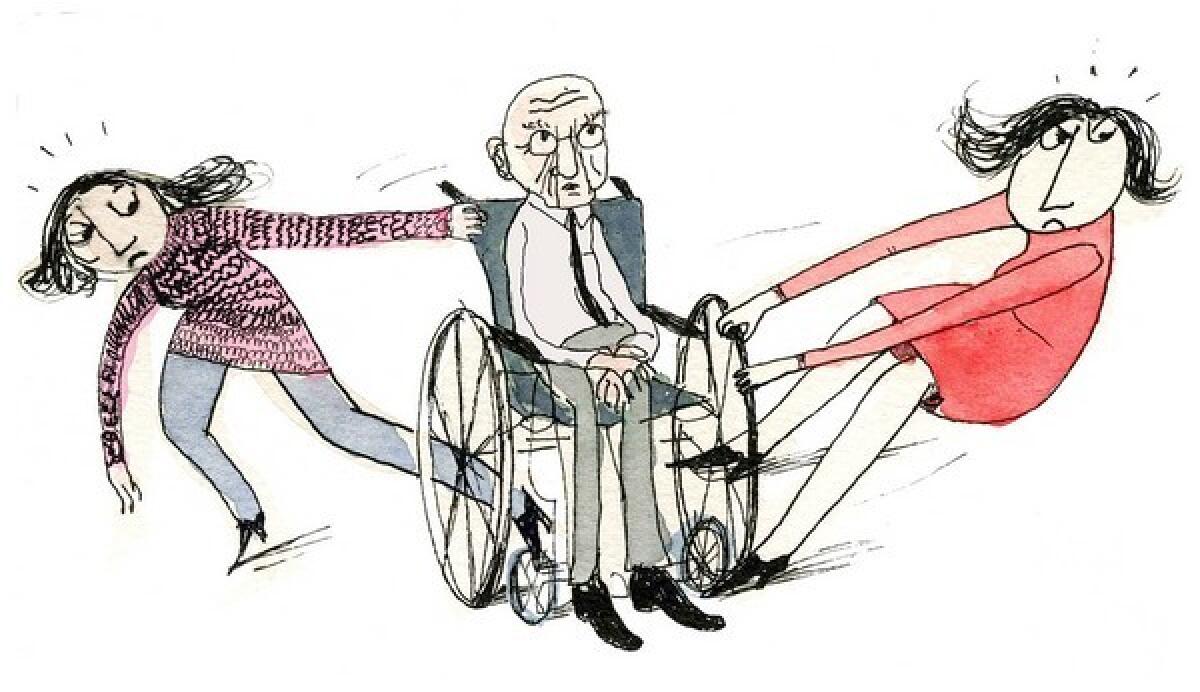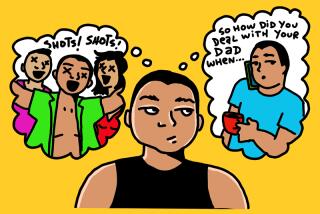Sister, it’s time for some sibling mediation

I always thought of myself as the good daughter, the one who would cheerfully pitch in to care for Mom and Dad if their health began to fail.
In reality, I wasn’t so selfless.
Yes, I stepped in to help when dementia began to wither my mom’s intellect and spirit, but no one would have described me as cheerful. Her disease cast a pall over my life: I was stressed, depressed, despondent.
And I desperately wanted my big sister -- seven years older and my only sibling -- to share my pain and to help me.
My situation wasn’t unusual: Many caregivers feel that their siblings aren’t doing their fair share. And that’s just one of many prickly issues that come to the fore as middle-aged sons and daughters struggle to reach consensus on their parents’ welfare.
We may be adults, but when we are confronted with family problems, all the decades-old dynamics come into play, experts say.
Gerontologist Sara Qualls equates the situation to being “put down in the center of a nuclear reactor with your siblings and being told to figure it out.” Qualls, director of the Gerontology Center at the University of Colorado at Colorado Springs, has been counseling families embroiled in sibling squabbles for 30 years. “A chain reaction can be set off if people don’t work together,” she says.
That chain reaction can result in long-term problems.
Long Beach resident Katrina Kerr got into a shouting match with her sister as their mother lay in bed dying from cancer. “I told her to stop fluffing the pillow and talk to Mom instead,” Kerr recalls. “It escalated.” They haven’t spoken in the nine years since the incident.
“All children have good motives,” says Forrest Mosten, a Santa Monica attorney who specializes in mediating elder issues. “They all want to take care of Mom and Dad and maybe get the recognition and pat on the head they never got as a child. But they don’t always communicate well with each other.”
Mosten is one of a burgeoning number of professionals who focus on mediating sibling problems. The growth is being driven by baby boomers who sometimes can’t cope with the challenges that face them.
“Families grow apart as children age,” says Mosten. “Suddenly we’re drawn back because of a crisis with our parents, who either need our care, or have passed on. We may have a hard time working together to find solutions.”
My own problem -- sharing care with a sibling -- ranks as a major cause of discord.
At least 43.5 million caregivers -- nearly one of five adults -- provide unpaid care to an older relative or friend, according to a recent survey by the AARP and MetLife-funded National Alliance for Caregiving.
Of these, only one in 10 said the burden was split equally. Almost half felt they had no choice in the matter.
Huntington Beach resident Mary Johnson, one of seven children, can relate. When her dad, Al, became ill, she shouldered the burden of his care.
“At one point, I was taking him to five or six doctors and trying to raise two small children. It was crazy.”
A friend said she should tell her siblings: “Pick a body part, any body part. And take him to that doctor.”
Eventually her family began to share expenses and care with her.
“Everyone tried to do their best, but someone always ends up doing more,” she said. “In my family, that was me.”
Other major areas of conflict, experts say, are financial assets and end-of-life decisions.
“Families often fight over money,” says James Bergman of the nonprofit Center for Social Gerontology in Ann Arbor, Mich., which trains mediators.
Bergman, co-director at the center, says the dispute often boils down to a simple difference of opinion.
“Some feel that it’s the parents’ money and it should be used as they want. Others feel that at least some part of the money should be passed down to the next generation.”
Bergman said medical treatment, including whether to authorize life-prolonging treatment, also causes stress.
His advice: Have a frank family discussion with your parents while it’s still possible.
“Find out what they want done with their money. Who do they want to pay bills? If they can no longer make healthcare decisions for themselves, who should make those decisions, or do they want decisions to be made jointly? Do they want life-prolonging treatments?”
If it’s too late to ask these questions and your siblings can’t reach a consensus, mediation might help, advises Bergman.
As for me, I’m not sure whether a mediator would have eased the strain between me and my sister. But airing our grievances in front of a neutral party would have been a healthy exercise.
But with time, our relationship has started to warm again.
Last year we went to a small family reunion in the Midwest. We both wore pink T-shirts that said, “I’m not sure if I’m the good sister or the bad one.”
--
INFOBOX:
How to find an elder-care mediator
-- Mediation involves the use of a neutral party to help families resolve disputes. Sometimes mediators are called in by a judge’s order, but many elder-care experts say mediation can be helpful long before a dispute makes its way to court. The key is finding a mediator who will help ease communication among family members.
-- Mediators are often attorneys or social service workers, but clergy or other experienced listeners can help guide conversations. A key is to find someone “who prompts you to say things in the most constructive way and avoid saying things that are mean-spirited,” says Deborah Gentry, an Illinois educator and elder-care mediation expert.
-- Costs range from free, if using a social service worker or clergy member, to hundreds of dollars an hour for legal advice.
-- There isn’t a certification or credentialing process, so families must be wary, says James Bergman, co-director of the nonprofit Center for Social Gerontology in Ann Arbor, Mich. “Anyone can hang up a shingle. Some are very good; some I wouldn’t want to get near.”
-- The Assn. for Conflict Resolution lists mediators. Mediators can also be found at www.mediate.com and www.eldercaremediators.com.
McClure’s column on caring for and staying connected with aging parents appears monthly. Past installments can be found at out “It’s All Relative” archive.
Comments: [email protected]
More to Read
Sign up for Essential California
The most important California stories and recommendations in your inbox every morning.
You may occasionally receive promotional content from the Los Angeles Times.










